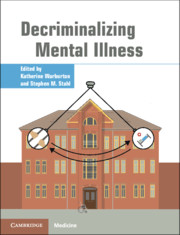Book contents
- Decriminalizing Mental Illness
- Decriminalizing Mental Illness
- Copyright page
- Contents
- Contributors
- Part I Introduction/Description of the Problem
- Part II Solutions
- Part III Psychopharmacological Treatment Considerations
- Part IV Nonpsychopharmacological Treatment Considerations
- Part V Criminal Justice and Social Considerations
- Chapter 28 Tipping the Scales Of Justice: The Role of Forensic Evaluations in the Criminalization of Mental Illness
- Chapter 29 Competence to Stand Trial and Criminalization: An Overview of the Research
- Chapter 30 Risk Factors for Recidivism in Individuals Receiving Community Sentences: A Systematic Review and Meta-Analysis
- Chapter 31 Developing Policies for Adult Sexual Minorities with Mental Health Needs in Secured Settings
- Chapter 32 An Overview of Jail-Based Competency Restoration
- Chapter 33 Fixated Threat Assessment Centres: Preventing Harm and Facilitating Care in Public Figure Threat Cases and Those Thought to Be at Risk of Lone-Actor Grievance-Fuelled Violence
- Chapter 34 Decriminalizing LGBTQ+: Reproducing and Resisting Mental Health Inequities
- Chapter 35 Building a Therapeutic Relationship Between Probation Officers and Probationers with Serious Mental Illnesses
- Chapter 36 Length of Stay for Inpatient Incompetent to Stand Trial (IST) Patients: Importance of Clinical and Demographic Variables
- Chapter 37 Severe Mentally Ill Patients: Our Global Migrants
- Index
- References
Chapter 36 - Length of Stay for Inpatient Incompetent to Stand Trial (IST) Patients: Importance of Clinical and Demographic Variables
from Part V - Criminal Justice and Social Considerations
Published online by Cambridge University Press: 19 October 2021
- Decriminalizing Mental Illness
- Decriminalizing Mental Illness
- Copyright page
- Contents
- Contributors
- Part I Introduction/Description of the Problem
- Part II Solutions
- Part III Psychopharmacological Treatment Considerations
- Part IV Nonpsychopharmacological Treatment Considerations
- Part V Criminal Justice and Social Considerations
- Chapter 28 Tipping the Scales Of Justice: The Role of Forensic Evaluations in the Criminalization of Mental Illness
- Chapter 29 Competence to Stand Trial and Criminalization: An Overview of the Research
- Chapter 30 Risk Factors for Recidivism in Individuals Receiving Community Sentences: A Systematic Review and Meta-Analysis
- Chapter 31 Developing Policies for Adult Sexual Minorities with Mental Health Needs in Secured Settings
- Chapter 32 An Overview of Jail-Based Competency Restoration
- Chapter 33 Fixated Threat Assessment Centres: Preventing Harm and Facilitating Care in Public Figure Threat Cases and Those Thought to Be at Risk of Lone-Actor Grievance-Fuelled Violence
- Chapter 34 Decriminalizing LGBTQ+: Reproducing and Resisting Mental Health Inequities
- Chapter 35 Building a Therapeutic Relationship Between Probation Officers and Probationers with Serious Mental Illnesses
- Chapter 36 Length of Stay for Inpatient Incompetent to Stand Trial (IST) Patients: Importance of Clinical and Demographic Variables
- Chapter 37 Severe Mentally Ill Patients: Our Global Migrants
- Index
- References
Summary
State psychiatric hospitals face increasing referrals for the evaluation and restoration of individuals whose mental health symptoms render them incompetent to stand trial (IST). As referrals can overwhelm capacity for admission, state hospitals at times are unable to admit IST patients in a timely fashion. The resulting use of “waitlists” have the undesirable consequence of forcing symptomatic individuals to endure long waits (while jailed) for admission to a psychiatric hospital. These long wait times have been determined to be unconstitutional, resulting in litigation against the responsible state mental health authorities. Unfortunately, available options to expedite hospital admission of these IST patients can have significant clinical and economic consequences.
- Type
- Chapter
- Information
- Decriminalizing Mental Illness , pp. 373 - 383Publisher: Cambridge University PressPrint publication year: 2021



